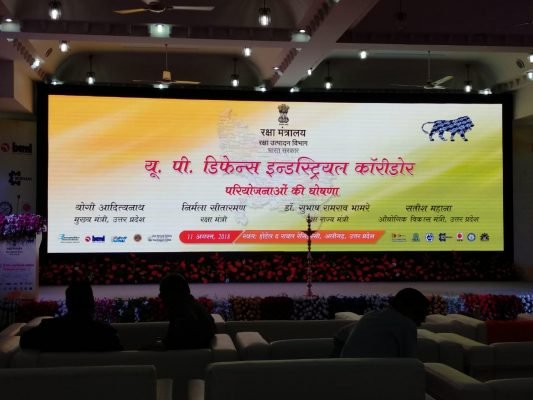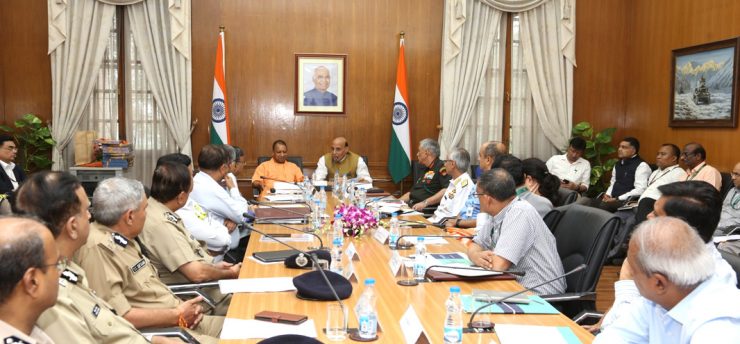
New Delhi. With the countdown having begun for the four-day DefExpo 2020 in Lucknow from February 5 to 8, the government has been going all out to make it a success spearheaded by none other than Defence Minister Rajnath Singh since it is his Lok Sabha constituency.
The DefExpo assumes importance as Uttar Pradesh along with Tamil Nadu has one of the two Defence Industrial Corridors and this would provide an opportunity to showcase the various facilities existing in the state to attract foreign companies to have joint ventures with Indian private and public sector units.
The DefExpo will showcase the government’s intent to achieve a turnover of US $26 billion in aerospace and defence goods and services by 2025.
As part of the ambitious Defence Industrial Corridor Project, Prime Minister Narendra Modi had laid the foundation of the flagship Bundelkhand Defence Industrial Corridor in Jhansi district of Uttar Pradesh, which is expected to attract investment of Rs 20,000 crore.
The Defence Corridor consists of various infrastructure projects totalling over Rs 40,000 crore in the arid Bundelkhand region.

The mega infra would span six nodes at Aligarh, Agra, Jhansi, Kanpur, Lucknow and Chitrakoot and create 250,000 job opportunities.
The Yogi Adityanath government has already identified about 5,000 hectares for the Corridor. Earlier, the Centre had de-licensed 275 defence wares and encouraged private manufacturers for such supplies by competing with the public sector undertakings (PSU). These items have been clubbed as ‘non-core items’ of Ordnance Factory Board (OFB). The army can float tenders, in which both the private sector and OFB can participate.

India is among the world’s largest military hardware importer and top five military spenders. To meet modernisation needs of the armed forces, India will acquire equipment worth US$ 250 billion by 2027, though, the current delivery capacity of the domestic defence sector is merely US$ 75-80 billion annually, indicating huge potential for the indigenous industry.
“The DefExpo will be an opportunity to foster partnerships and be part of shared prosperity. These strong ties can boost investment, expand manufacturing, raise the level of technology and accelerate the economic growth of the respective countries. India’s defence sector has matured, and is exploring mutually beneficial partnerships with friendly nations to set up industries in the country and abroad,” Singh told representatives of foreign missions on the DefExpo.
The event will showcase India’s plans for defence industrial corridors in Uttar Pradesh and Tamil Nadu, where investment commitments of about US$ 1 billion have already been received.
More than 100 business events and seminars are being planned with over 1,000 exhibitors expected to take part in the DefExpo.
The minister said due to the policy reforms undertaken by the government, defence production in both public and private sectors had reached a record volume of Rs 80,502 crore in 2018-19.
He set the target of Rs 90,000 crore for 2019-20.
“We achieved an export turnover of around Rs 10,700 crore in 2018-19, with the target of this year pegged at Rs 15,000 crore,” he said.
Apart from the various stalls and business meetings, the DefExpo would also provide an opportunity to update visitors and others about the latest developments in the defence industry and the future of defence industry through the various seminars and discussions on a wide variety of subjects ranging from skill development in aviation and defence, role of digital media in the battlefield and the role of cyber space in the defence sector.
With theme for the DefExpo being “Digital Transformation of Defence,” the focus would also be on how India can attain self-reliance and indigenisation in defence for both strategic and economic reasons.
The DefExpo would provide the platform for the Indian public and private sectors to explore avenues where they can have joint ventures with foreign companies who would be participating in the exhibition.
Though India has made rapid strides in defence technology and industrial base in recent past, it is yet to cover a significant ground in terms of new products development and scale of production. The domestic defence industry would have limited scope for investment in R&D and production if it relies only on the domestic demand.
There is a need to promote investment in the defence sector, both in R&D and production, thereby resulting in higher self-reliance and indigenisation. While putting in place the policy framework and procedural mechanisms, the thrust would be on indigenous production and exploring possibilities of exports to other nations that may look forward to supplies from India.
The exhibition would provide an opportunity to Indian defence manufacturers in both private and public sector to showcase their wares since the attendance at the exhibition is the highest so far compared to the earlier ones specially the one held in Chennai in 2018 as there will be almost 1,000 exhibitors from India and abroad. There would also be delegations at the level of Defence Ministers and Service Chiefs from 18 countries offering immense opportunities to indigenous defence companies.
With the government’s avowed aim being “Make in India,” the DefExpo is indeed an opportunity to push forward this.
The DefExpo would also provide a platform to the officials connected with defence to give an exposition of the country’s defence and encourage Indian manufacturers to enter into joint ventures with foreign companies.
The focus at meetings could also be on what has been repeatedly stated by the government regarding defence sector that there should be Transfer of Technology (TOT) and also make it clear to any foreign company wishing to collaborate in the defence sector, the offset policy of the government so that this could also help these foreign Original Equipment Manufacturers (OEMs) to enter into joint ventures with Indian companies, who are in the defence sector.








